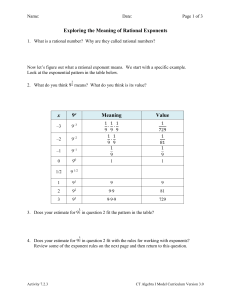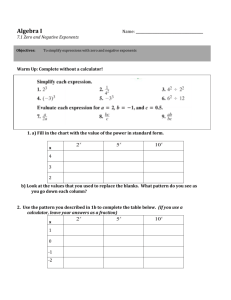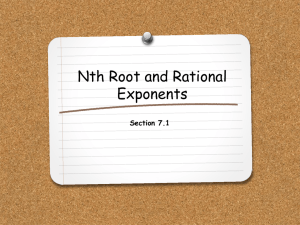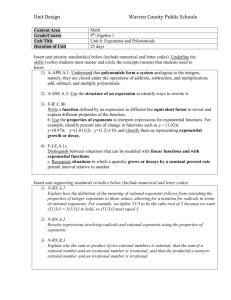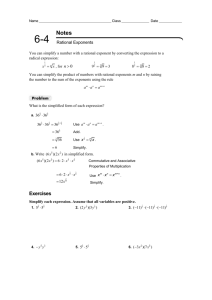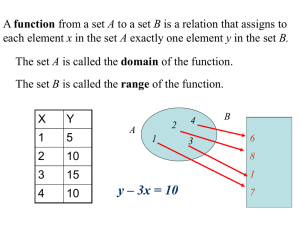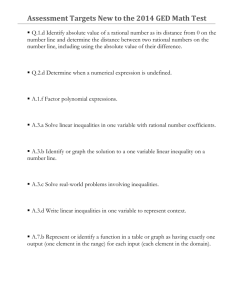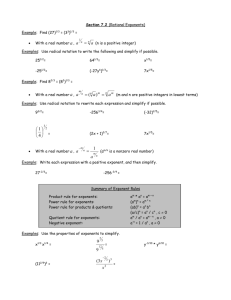5.3 Rational Exponents and Roots In this lesson, we will (1
advertisement
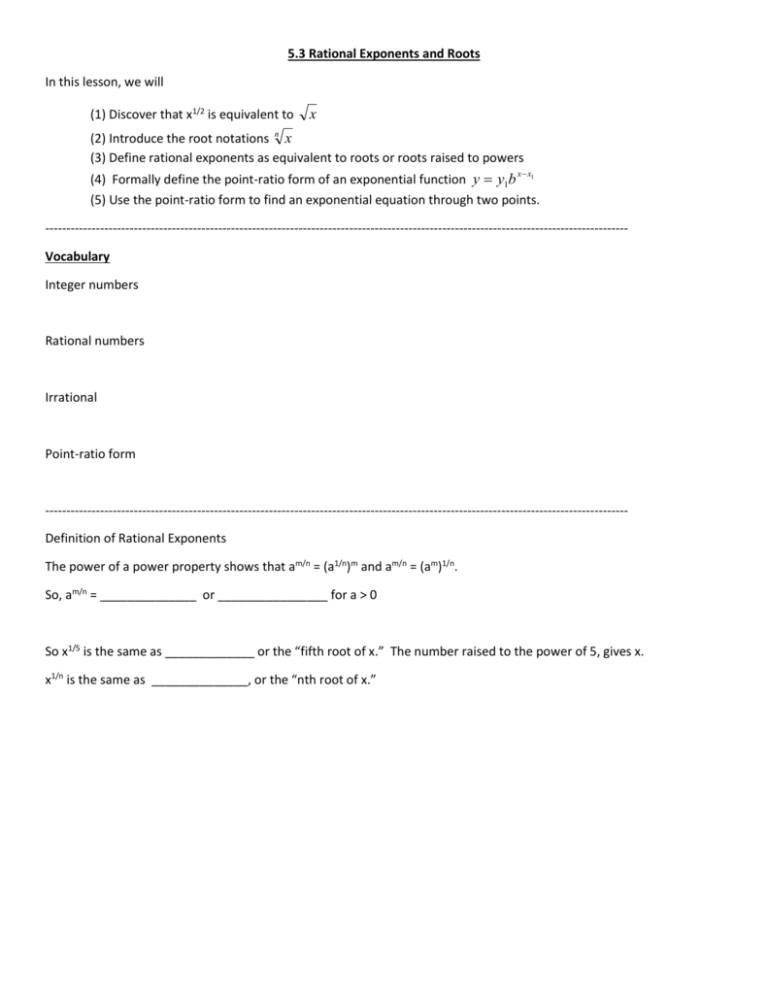
5.3 Rational Exponents and Roots In this lesson, we will (1) Discover that x1/2 is equivalent to x (2) Introduce the root notations n x (3) Define rational exponents as equivalent to roots or roots raised to powers (4) Formally define the point-ratio form of an exponential function y y1b x x1 (5) Use the point-ratio form to find an exponential equation through two points. -----------------------------------------------------------------------------------------------------------------------------------------Vocabulary Integer numbers Rational numbers Irrational Point-ratio form -----------------------------------------------------------------------------------------------------------------------------------------Definition of Rational Exponents The power of a power property shows that am/n = (a1/n)m and am/n = (am)1/n. So, am/n = ______________ or ________________ for a > 0 So x1/5 is the same as _____________ or the “fifth root of x.” The number raised to the power of 5, gives x. x1/n is the same as ______________, or the “nth root of x.” Investigation: Getting to the Root In this investigation you’ll explore the relationship between x and x1/2 and learn how to find the values of some expressions with rational exponents. Step 1 Use your calculator to create a table for y = x1/2 at integer values of x. When is x1/2 a positive integer? Describe the relationship between x and x1/2. Step 2 Graph y = x1/2 in a graphing window with x- and y-values less than 10. This graph should look familiar to you. Make a conjecture about what other function is equivalent to y = x1/2, enter your guess as a second equation, and verify that the equations give the same y-value at each x-value. Step 3 statement. State what you have discovered about raising a number to a power of ½. Include an example with your -----------------------------------------------------------------------------------------------------------------------------------------Step 4 Clear the previous functions, and make a table for y = 25x with x incrementing by ½. Step 5 Study your table and explain any relationships you see. How could you find the value of 493/2 without a calculator? Check your answer using a calculator. Step 6 How could you find the value of 272/3 without a calculator? Verify your response and then test your strategy on 85/3. Check your answer. Step 7 Describe what it means to raise a number to a rational exponent, and generalize a procedure for m/n simplifying a . ------------------------------------------------------------------------------------------------------------------------------------------ Example A: Rewrite with rational exponents, and find the positive solution. a. 4 a 14 b. 9 b 5 26 c. c 3 8 47 Example B: Casey hit the bell in the school clock tower. Her pressure reader, held nearby, measured the sound intensity, or loudness at 40 lb/in2 after 4 s had elapsed and at 4.7 lb/in2 after 7.2 s had elapsed. She remembers from her science class that sound decays exponentially. a. Name two points that the exponential curve must pass through. b. Find an exponential equation that models these data. c. How loud was the bell when it was struck (at 0 s)? 5.3 Practice What You Learned 1. Match all expressions that are equivalent. a. x2 5 1 f. x b. x2.5 3 g. c. x 5 3 x h. x3 d. x5/2 e. x0.4 i. x1/3 j. x2/5 2. Identify each function as a power function, an exponential function, or neither of these. (It may be translated, stretched, or reflected.) Given a brief reason for your choice. a. f(x) = 17x5 e. b. f(t) = t3 + 5 g ( y) 3 y 2 i. 8 f ( y) 4 1 y c. g(v) = 200(1.03)v f. f(t) = t2 + 4t + 3 g. h(t ) x3 2 j. g ( x) 1 x k. h(w) = d. h(x) = 2x – 7 12 3t 5 h. g ( w) 4w3 28 w5 l. p(x) = 5(0.8)(x-4)/2 3. Rewrite each expression in the form bn in which n is a rational exponent. a. 6 a b. 10 b8 c. 1 d. c d 5 7 4. Solve each equation and show or explain your step(s). Approximate answers to the nearest hundredth, if necessary. a. 6 a = 4.2 e. 95 x 4 17 b. 10 b8 = 14.3 c. f. 5x 4 30 1 c = 0.55 d. d 5 7 = 23 g. 43 x 2 35 10. Each of the red curves is a transformation of the graph of the power function y = x3/4, shown in black. Write an equation for each red curve. a. b. c. d. Name: ____________________________ Algebra 2 Homework 5.3 Rational Exponents and Roots 1. Identify each function as a power function, an exponential function, or neither of these. (The function may be translated, stretched, or reflected.) a. 2. f(x) = 0.5x3 – 4 4. c. f ( x ) 1 2 x c3 b. d 4 3 1 c. r5 Solve each equation for positive values of x. If answers are not exact, approximate to the nearest hundredth. a. f. 1 3x Rewrite each expression in the form bx in which x is a rational exponent. a. 3. b. f ( x ) 5 5 x 3 27 x 3 23 15 1 b. e. x 3 0.77 4 x 2 8.5 19.8 c. 43 x 18 32 f. 8 x 5 12.75 Each of the following graphs is a transformation of the power function y = x3/2. Write the equation for each curve. 5. Dan placed three colored gels over the main spotlight in the theater so that the intensity of the light on state was 900 watts per square centimeter (W/cm2). After he added two gels, making a total of five over the spotlight, the intensity on stage dropped to 600 W/cm2. What will be the intensity of the light on stage with six gels over the spotlight if you know that the intensity of light decays exponentially with the thickness of material covering it? 14. Use properties of exponents to find an equivalent expression in the form axn or axnym. 3 3 a. (3x ) 3 2 3 b. (2x )(2x ) 6x 4 c. 30 x 5 2 72 x 5 y 5 e. 4x3 y 2 3 d. (4x )(3x ) 15. For graphs a-h, write the equation of each graph as a transformation of y = x2 or y x. 17. The town of Hamlin has a growing rat population. Eight summers ago, there were 20 rat sightings, and the numbers have been increasing by about 20% each year. a. Give a recursive formula that models the increasing rat population. Use the number of rats in the first year as u1. b. About how many rat sightings do you predict for this year? c. Define variables and write an equation that models the continuous growth of the rat population.
